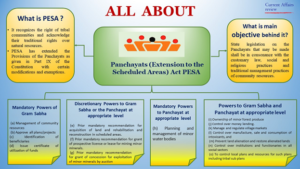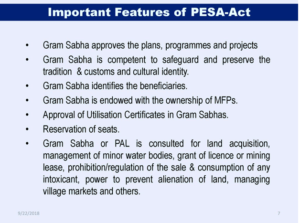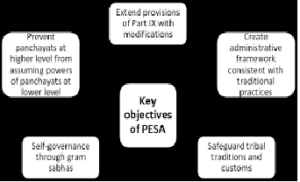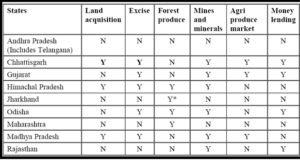PESA Act will curb conversions, marriages for tribal land
Why in News?
- Recently, Madhya Pradesh’s Chief Minister stated that PESA Act will help curb conversions and marriages for tribal land.
- Issue:
- Many times by deception, trickery, marriages done by means of allurement to our tribal sisters’ daughters, land is given in their name and called tribal lands.
- Sometimes even the means of conversion is used to achieve the purpose.
- Use of PESA to curb this practice:
- State CM said that the Panchayats Extension to Scheduled Areas (PESA) Act, which gives more power to gram sabhas, will ensure that conversions and marriages done by “alluring” tribal women to get land notified as tribal land is stopped.
- He said that Gram sabhas will intervene when land is taken away from someone, emphasising that conversions will not be allowed to happen in the state.
- He also announced rules for enforcement of the Act in Madhya Pradesh.
- State CM said that the Panchayats Extension to Scheduled Areas (PESA) Act, which gives more power to gram sabhas, will ensure that conversions and marriages done by “alluring” tribal women to get land notified as tribal land is stopped.
- Not against any community:
- He also made it clear that initiative was not against any community, but aimed at empowering the tribal community.
- Highest tribal population:
- The state has the highest tribal population in the country and that the rules under PESA would help in the development of tribal communities.
Keypoints:
Tribals & issue of Conversions
- About:
- Tribals in India follow their own aboriginal religion and more than 89% of the tribals follow Hindu religion.
- Due to their tact with other Hindu communities, they have turned to Hinduism.
- Tribals of India & the problem of religious conversion:
- Issue:
- The overall helpless condition of the tribals due to poverty, illiteracy, little opposition to conversion, lack of control over conversion, enticing offers and social status besides the tribal community’s desire to improve economic condition are some of the factors responsible for the religious conversion of the tribals.
- As a result, in different parts of India tribals of certain areas and several main tribal community groups have converted themselves to Christianity & other religions in the last hundred and fifty years.
- Issue:
- Influence of Christianity:
- The influence of Christianity on the tribals began in the Khasi of Meghalaya in 1813; in Urano of Chooa Nagpur in 1850 and in the Bhils of Madhya Pradesh in 1880.
- The tribals have been facing the problem of religious conversion for a long time.
- Problem for society as a whole:
- The religious conversion among the tribals has also created certain influences on the tribal communities which has become problematic for the tribal community and the Indian society as a whole.
- It has resulted in westernization, urbanization and industrialization of cultural practices, ritual, occupation, tradition causing harmful repercussions of tribal ethnicity and values.
- The influence of Christianity on the tribals began in the Khasi of Meghalaya in 1813; in Urano of Chooa Nagpur in 1850 and in the Bhils of Madhya Pradesh in 1880.
Anti-conversion laws in India
- About:
- There are a few states (Arunachal Pradesh, Orissa, Madhya Pradesh, Chhattisgarh, Gujarat, Himachal Pradesh, Jharkhand, and Uttarakhand) which have enacted upon anti-conversion law in India.
- Aim:
- The basic aim of the legislation was to prevent the individual and communities from converting one’s religion of their forefathers to another religion mainly weaker or influential sectors of society namely women, children, backward classes and untouchables.
- Major Criticisms of Anti Conversion Law:
- Right to Choice of religion:
- The Anti-Conversion law enacted a restriction on conversion to one’s choice of religion, practice, propagate and promote so converted religion and thereby infringes the right to privacy of individuals.
- Forced prosecutions:
- Religious leaders of minority communities faced apprehension of being arrested and prosecuted under anti-conversion law.
- For example, Catholic nuns and four other tribal women were detained based on suspicion of inducing conversion.
- Religious leaders of minority communities faced apprehension of being arrested and prosecuted under anti-conversion law.
- Right to Choice of religion:
About Panchayat Extension to Scheduled Areas Act, 1996
- About:
- PESA allows gram panchayats to decide matters related to minor forest produce, land and small water bodies along with implementation of government schemes and maintaining records of migrant labourers for curbing bonded labour in these scheduled areas.
- Background:
- The 73rd and the 74th Amendments to the Indian Constitution passed in 1992 took the three-tier Panchayati Raj governance structure to rural and urban parts of the country
- It came into force in April 1993.
- However, scheduled areas, predominantly inhabited by the tribal population, were exempted from the new amendments.
- Given low human development indicators, there was a huge demand to empower local governance in the scheduled area as well.
- Thus Parliament enacted special legislation called Panchayat (Extension to Scheduled Areas) Act (PESA) in 1996
- It came into force on 24th December 1996.
- Objectives:
- To extend the provisions of Part IX of the Constitution relating to the Panchayats to the Scheduled Areas with certain modifications.
- To provide self-rule for the bulk of the tribal population.
- To have village governance with participatory democracy and to make the Gram Sabha a nucleus of all activities.
- To evolve a suitable administrative framework consistent with traditional practices.
- To safeguard and preserve the traditions and customs of tribal communities.
- Applicability:
- It is now applicable in the Fifth Schedule areas, which deals with the administration of the districts dominated by the tribal communities.
- It is in force in 10 states of the country.
- Six States namely Andhra Pradesh, Himachal Pradesh, Gujarat, Maharashtra, Rajasthan and Telangana have notified PESA Rules.
- The remaining four States namely Chhattisgarh, Jharkhand, Madhya Pradesh and Odisha should also frame PESA Rules and start implementing them soon.
- The Gram Sabhas under PESA Act were entrusted with wide-ranging powers to:
- Enforce prohibition or to regulate or restrict the sale and consumption of any intoxicant.
- Ownership of minor forest produce.
- Prevent alienation of land in the Scheduled Areas and to take appropriate action to restore any unlawfully alienated land of a Scheduled Tribe.
- Manage village markets by whatever name is called.
- Exercise control over money lending to the Scheduled Tribes.
- Exercise control over institutions and functionaries in all social sectors.
- Control over local plans and resources for such plans including tribal sub-plans.
- The 73rd and the 74th Amendments to the Indian Constitution passed in 1992 took the three-tier Panchayati Raj governance structure to rural and urban parts of the country








